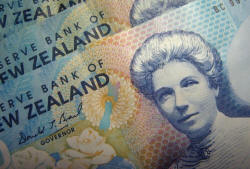Central bank review sends Kiwi to 5-month lows
 Send a link to a friend
Send a link to a friend
 [October 24, 2017]
By Ritvik Carvalho [October 24, 2017]
By Ritvik Carvalho
LONDON (Reuters) - The New Zealand dollar
was the biggest mover in relatively stable trade in G10 currencies on
Tuesday, falling to a five-month low after the incoming Labour
government outlined its policies.
The government reaffirmed a commitment to reduce immigration, raise the
minimum wage and ban foreigners from buying local homes, seen by
investors as a unfriendly to investment from abroad.
But the most pressing concern, analysts said, was a plan to review and
reform the central bank's mandate to possibly include employment
alongside inflation as a dual target.
"It (the plan) has had a negative effect on the Kiwi because having a
dual mandate is likely to keep the Reserve Bank of New Zealand a lot
more dovish than it currently is. It's got quite a neutral stance at the
moment," said Martin Arnold, currency strategist at ETF Securities in
London.

"They're probably going to have to keep policy quite accommodative for
some time if they're going to have the dual mandate of inflation as well
as full employment like the Federal Reserve."
The Kiwi dollar has lost nearly 5 percent after the Labour Party secured
power following an election last month.
It was last over half a percent lower at $0.6965 by afternoon trade in
Europe. <NZD=D4>
The dollar index, which measures the greenback against a basket of
peers, edged lower, stepping back from recent highs as market attention
turns to who will be the next head of the U.S. central bank. It was down
0.1 percent at 93.848. <.DXY>
U.S. President Donald Trump told reporters on Monday he is "very, very
close" to deciding who should chair the Federal Reserve after
interviewing five candidates for the position. [nL2N1MY0YO]
[to top of second column] |

Reserve Bank of New Zealand dollar notes are pictured in Singapore
June 22, 2006.

These include current Fed Chair Janet Yellen, whose term expires in February, as
well as Fed Governor Jerome Powell, Stanford University economist John Taylor,
Trump's chief economic advisor Gary Cohn, and former Fed Governor Kevin Warsh.
(For a graphic on Fed Chair candidates, click here: http://tmsnrt.rs/2fPVp1I)
"It's a big question for the markets. It's one thing to speculate about it, but
it's another to take an FX position," said Bart Wakabayashi, branch manager for
State Street Bank in Tokyo.
"Still, the rumors trigger some selling and buying, on perceptions of who might
be more dovish or more hawkish," he said.
The dollar also gained against the yen, up nearly half a percent at 113.94 yen
per dollar and just below a 3-month top hit on Monday after the Japanese
elections. <=JPY>
The euro added 0.1 percent to $1.1762 <EUR=>, though its gains were expected to
be capped ahead of the European Central Bank's policy meeting on Thursday, where
the authority is expected to signal it will take small steps away from its
ultra-easy monetary policy.
The euro has been pressured in recent weeks by Catalonia's separatist crisis.
Madrid has invoked special constitutional powers to dismiss the Catalonian
regional government and force elections to counter the independence movement.
[nL8N1MY3PX]
A vote in the national Senate to implement direct rule on Catalonia is due on
Friday.

(Reporting by Ritvik Carvalho; Editing by Angus MacSwan and Richard Balmforth)
[© 2017 Thomson Reuters. All rights
reserved.] Copyright 2017 Reuters. All rights reserved. This material may not be published,
broadcast, rewritten or redistributed. |